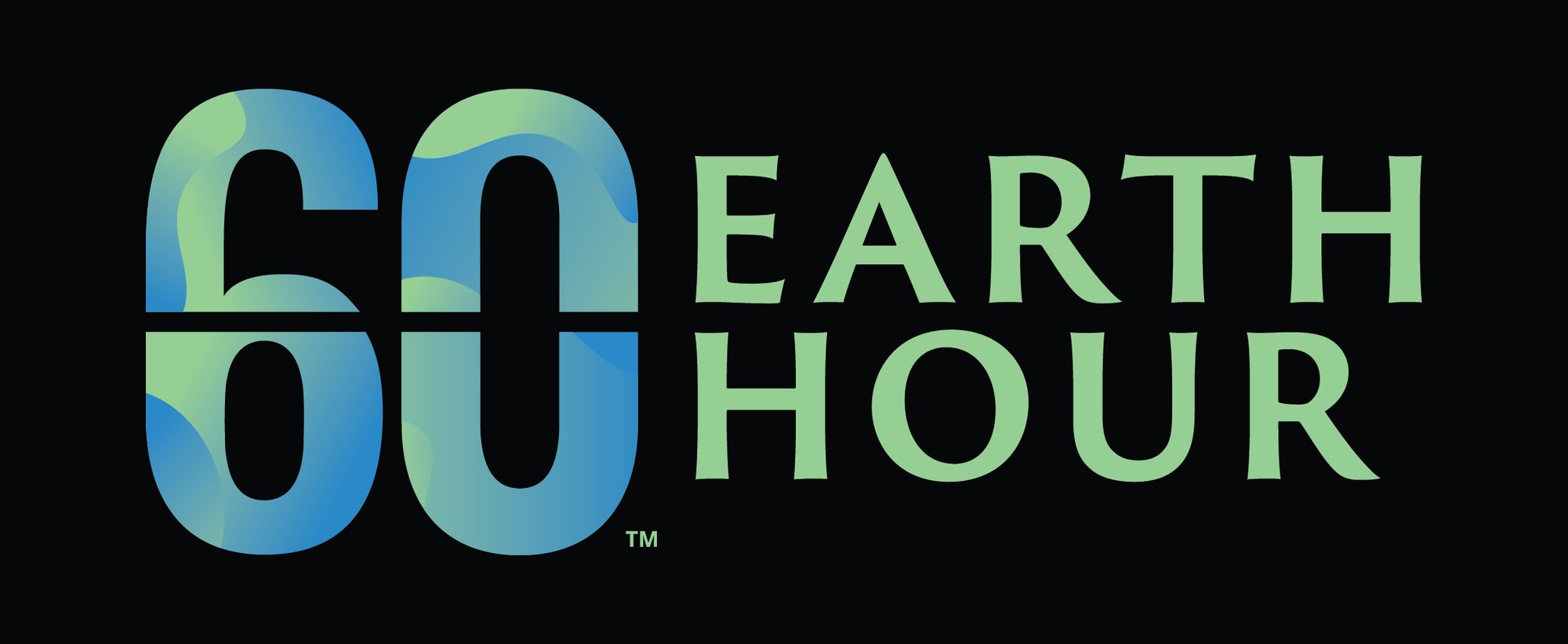Reports
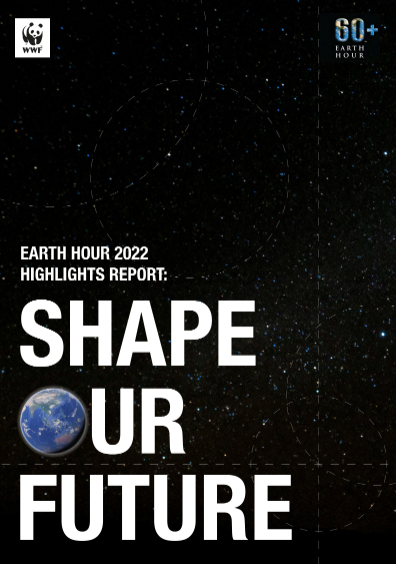
EARTH HOUR 2022
Set against the backdrop of another challenging year – with the ongoing COVID-19 pandemic, war and social unrest, natural disasters and more – Earth Hour 2022 created an opportunity to gather in unity and show solidarity with people and the planet. Individuals, public figures and organizations from 192 countries and territories came together under the “Shape our Future” theme to call for a safer, fairer and more sustainable future for everyone. We saw landmarks turn off their lights and supporters switch off at home, as well as a range of activities such as virtual concerts, mangrove planting, street clean-ups and virtual runs.
Public figures and celebrities, such as UN Secretary-General António Guterres, Justin Trudeau, Ellie Goulding, Iwan Rheon, Claudia Bahamón, Gianella Neyra, Mr Leo, Ben Pol, Liu Wen, Dilraba Dilmurat, Shruti Haasan and many more, also showed their support.
With this outpouring of support, Earth Hour made media headlines across the world, generated a record-breaking 10.1+ billion social media impressions globally and trended across 35 countries on Twitter or Google search. All of this showed that despite these difficult times, a moment like Earth Hour could yet again bring people together – not only to show their solidarity with each other and the one home we all share, but to help build a world where all people and nature live in harmony. Thank you to each and every one of you who made this possible.
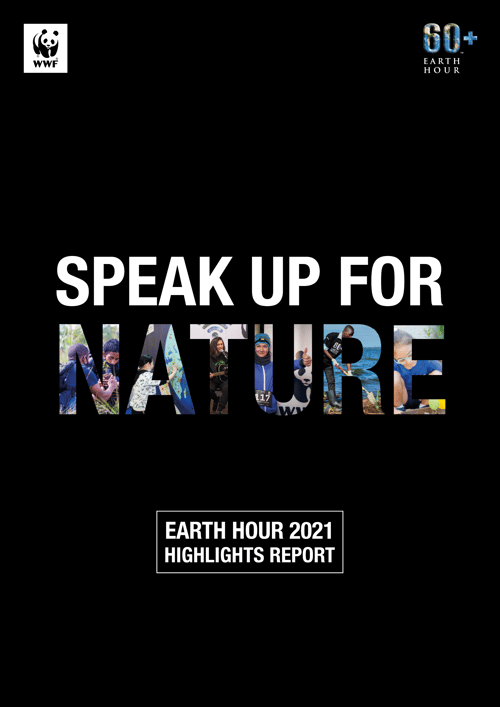
EARTH HOUR 2021
Earth Hour has always drawn its power from the people and this year was no exception. With many parts of the world still facing lockdowns and COVID-19 restrictions, Earth Hour brought together more people than ever before to speak up for nature. We saw participation from a record breaking 192 countries and territories and over 9.6 billion social media impressions, more than double last year’s number of impressions!
Launched on the night of Earth Hour, the Virtual Spotlight video, which highlighted the link between nature loss and the increasing risk of pandemics, was viewed 2.4 million times in 24 hours, making it the most watched video in Earth Hour history. Earth Hour teams also hosted exciting digital events, activities and campaigns, while public figures, celebrities, youth organizations and businesses from across the globe showed their support for Earth Hour online. All of this helped put the spotlight on the nature and climate crises, inspiring action to protect our one shared home.
The incredible success of Earth Hour continues to exemplify the collective desire for change towards a stable climate and nature-positive future. It also showed the global demand for urgent action in tackling our planet’s biggest environmental challenges, setting the stage for crucial climate and nature conferences taking place later this year.
Our sincere thanks for your participation in Earth Hour 2021. With support from all of you, let’s raise awareness of the interconnected issues facing our planet and build a safer, healthier future for people and nature together.
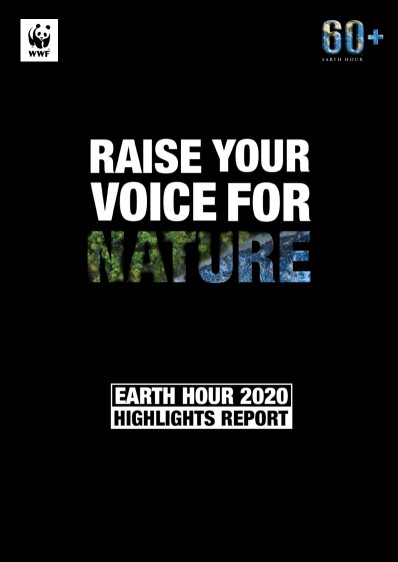
EARTH HOUR 2020
This year, in light of the COVID-19 pandemic, Earth Hour was delivering a message more pertinent than ever - raising awareness of the ever-deepening crisis of nature loss and climate change, and addressing how every one of us must play our part in protecting our one shared home, which means, in turn, protecting ourselves.
Despite the difficult times, Earth Hour 2020 proved to be bigger than ever with 190 countries and territories taking part and over 4.7 billion global social media impressions.
2020 was a unique year and whilst events took place digitally instead of physically, the movement was still able to strongly amplify our vital message. Earth Hour continues to shine a light on the deep connections between climate change and nature loss – that we can’t beat climate change without protecting nature nor re-establish a thriving natural world without a stable climate.
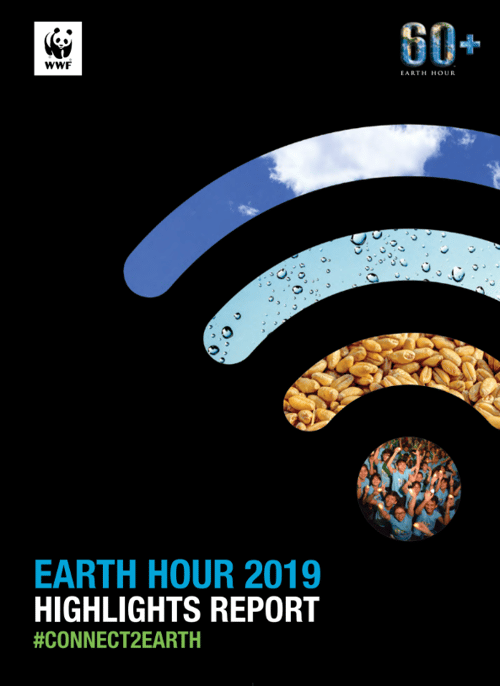
EARTH HOUR 2019
Millions around the world came together on 30 March 2019 to speak up for nature and inspire urgent action for the environment. As Earth Hour rolled around the globe, thousands of landmarks switched off their lights in solidarity for the planet. #EarthHour, #Connect2Earth and related hashtags trended in 26 countries as people across the globe generated over 2 billion impressions to show their concern for nature. People pledged their support for the planet, challenging world leaders to push the issue up the global agenda. From Ecuador to Morocco to Indonesia, Earth Hour 2019 mobilized people across continents to speak up on issues such as sustainable lifestyles, plastic-free oceans, deforestation and water conservation to help raise awareness of the value of nature – a vital first step in starting a global movement for nature.
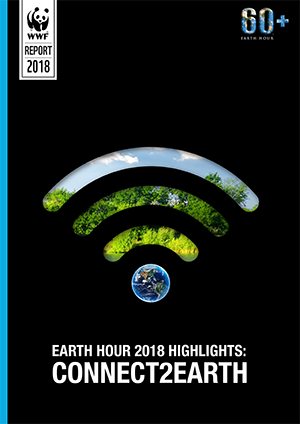
EARTH HOUR 2018
Individuals, businesses and organizations in more than 188 countries and territories worldwide joined WWF’s Earth Hour to spark unprecedented conversation and action on stopping the loss of nature, a day after 550 scientists warned of a ‘dangerous decline’ in global biodiversity. Close to 18,000 landmarks switched off their lights in solidarity as people across the globe generated over 3.5 billion impressions of #EarthHour, #connect2earth and related hashtags to show their concern for the planet. The hashtags trended in 33 countries.
From Colombia to Indonesia to Fiji, Earth Hour 2018 mobilized people to join efforts to protect forests and mangroves. In Romania, hundreds of people showed their commitment to safeguarding nature by writing symbolic letters to rivers, forests and wildlife. In Africa, 24 countries celebrated Earth Hour to highlight the most pressing conservation challenges they face such as access to renewable energy, freshwater resources and habitat degradation.
This Earth Hour, for the first time, people across the globe also joined the conversation on connect2earth.org to share what nature means to them, in the places they live in and care about. The platform aims to build mass awareness on the values of biodiversity and nature to our lives, health and well-being.
DOWNLOAD THE 2018 REPORT (ENGLISH)
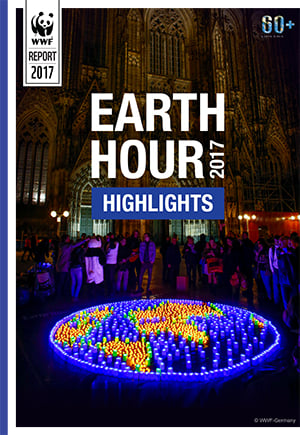
EARTH HOUR 2017
On Saturday, 25 March 2017, WWF’s Earth Hour rolled across the world once again - from Nairobi to New York, Delhi to Dublin, millions of you came together to shine a light on climate action. An unprecedented 187 countries and territories took part, over 3,000 landmarks switched off their lights and millions of individuals, businesses and organizations across seven continents stepped forward to change climate change.
The record participation was a fitting celebration for the movement’s tenth anniversary and came at a time when the need for climate action was greater than ever. It is also a testament to the incredible effort, dedication and passion of the WWF and Earth Hour teams - as well as our grassroots communities and youths - around the world. Thank you all for working tirelessly to be able to mobilise millions of people for the planet.
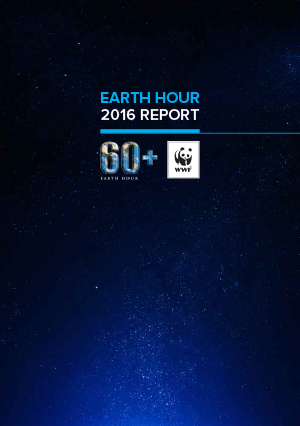
EARTH HOUR 2016
On Saturday 19 March, Earth Hour 2016 was celebrated in a record-breaking 178 countries and territories across seven continents and aboard the International Space Station, serving as a strong visual reminder of the globe’s determination to tackle our planet’s biggest environmental challenge yet.
In 2016, in recognition of the interconnected world we live in today thanks to social media and the crosscutting nature of climate change itself, Earth Hour aimed to move the movement for climate action from skylines to timelines. The movement encouraged people to not only support climate projects as in previous years, but also help in spreading the word by ‘donating their social power’ and taking a stand against climate change on their own personal landmark- their Facebook and Twitter accounts.
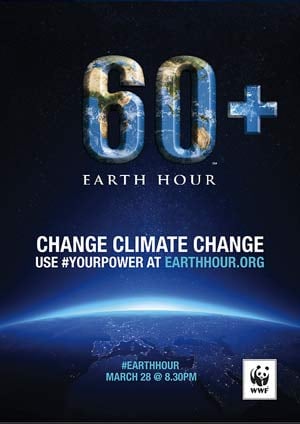
EARTH HOUR 2015
Agriculture and food production are highly vulnerable to changes in climate variability, seasonal shifts, and rainfall patterns caused by climate change. Experts predict that changes in temperature, rainfall and seasonal trends will impact production of staples and crops like corn, beans, cocoa, and even coffee, which require certain conditions for cultivation.
In 2015, WWF and Earth Hour teams around the world drove awareness on the impact of climate change on agriculture and how consumers, businesses and communities can each take action. From spreading awareness on consuming wisely to sustainable dinners on the night of Earth Hour (the UK, Finland and France) and creating the world’s first ever Earth Hour recipe book Planet to Plate with recipes by 52 celebrity chefs in Australia, sustainable food and agriculture was a major theme for Earth Hour 2015.
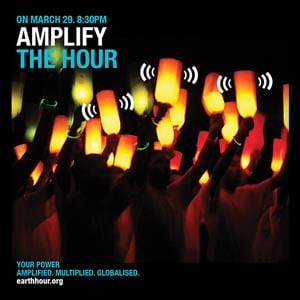
EARTH HOUR 2014
Earth Hour in 2014 swept the globe, bringing together millions of people from 162 countries and territories across all continents. The movement proves that one person has the capacity to inspire change. In 2014, Earth Hour embarked on the most exciting stage of its evolution to be at the forefront of crowdfunding and crowdsourcing for the planet. We call this Earth Hour Blue.
